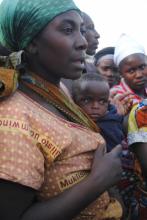Global Issues
ON SEPT. 23, 2003, Steven Kim was arrested and later escorted into a detention center in northeastern China with bound hands and heavy chains on his feet. His crime? Helping undocumented migrants—North Korean refugees—in China.
After decades of famine, mismanagement of resources, and a severe state-controlled system, the Democratic People's Republic of Korea—more commonly known as North Korea—has evolved into one of the most secretive and isolated countries in the world. About 2 million people have died since the 1990s, and still the country cannot feed its people without foreign aid. This shortage of food has driven thousands of North Koreans to migrate illegally to China by crossing the Tumen River in search of food and respite from the totalitarian regime.
Before his imprisonment, Kim—a Korean-American businessman from Long Island, N.Y.—lived in China and operated a furniture business. As a non-denominational Christian, Kim became a member of an unregistered house church in Shenzhen, which operated outside the Chinese government's control. After meeting Tae Nam, a North Korean man, and hearing his desperate story firsthand at his house church, Kim was instantly drawn into the underground railroad of supporters of North Korean refugees.
AFTER SEVEN MONTHS at a detention center, Kim was sentenced to five years in prison, under Article 318 of the Chinese criminal code, for helping undocumented North Korean migrants and harboring them in his home.
 A few weeks back at the Justice Conference we had the chance to sit down with Jeremy Courtney, cofounder of the Preemptive Love Coalition, to tell the story of his amazing work in Iraq providing heart surgery for children.
A few weeks back at the Justice Conference we had the chance to sit down with Jeremy Courtney, cofounder of the Preemptive Love Coalition, to tell the story of his amazing work in Iraq providing heart surgery for children.
Special thanks to Matthew Willingham and everyone at the Preemptive Love Coalition for providing us with footage from Iraq to tell their story.
The video below is a first in our new series Sojo Stories, where we sit down with individuals to hear their stories about using their talents for the common good.

Cardinal Keith O’Brien of Scotland resigned on Monday in the wake of explosive charges that he had made “inappropriate” sexual advances to four men, three of them priests, and one now a former seminarian, starting in the 1980s.
O’Brien said he would skip next month’s conclave to elect a successor to Pope Benedict XVI, leaving the United Kingdom without a cardinal’s voice in the election of a new pope.
In a statement, O’Brien said Benedict had accepted his resignation effective immediately, and he appeared to allude to the events surrounding his sudden exit.
“Looking back over my years of ministry: For any good I have been able to do, I thank God. For any failures, I apologize to all whom I have offended,” said the cardinal, who turns 75 next month, which is the mandatory retirement age for bishops. Cardinals retain the right to vote in a conclave until age 80.
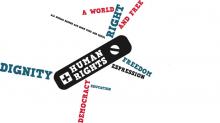
Carolyn Winfrey Gillette wrote this hymn in celebration of Human Rights Day (December 10), the anniversary of the adoption of the Universal Declaration of Human Rights.
Seven years later, on Dec. 5, 1955, the Montgomery Bus Boycott began with 40,000 African-Americans walking, bicycling or car-pooling to pressure the bus company for change. The boycott ended in victory after 381 days. December is a good month to remember past work for justice and to work for it today as we celebrate the one who came “to give light to those who sit in darkness and in the shadow of death, to guide our feet into the way of peace" (Luke 1:79).
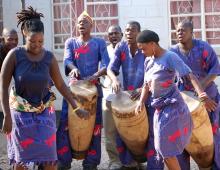
As people of faith, it is not uncommon to pray for miracles when faced with overwhelming obstacles. For many of us, AIDS has been one of those mind-boggling, heart-wrenching causes that has wreaked havoc on the world and been the subject of many prayers.
Since the early days of the disease, the focus has been on a cure. Researchers worked tirelessly for it and the faithful asked God to provide it. But the cure has never come.
And yet, as we mark another AIDS Day this Saturday, Dec. 1, there is evidence of the miraculous.
After 24 years of commemorating this day with grim statistics and little hope, there is finally good news.
Millions of people are receiving treatment. Many fewer people are dying.
The new infection rate has dropped by 50 percent or more in 25 countries since 2001. With access to treatment, being HIV-positive is now considered a chronic disease, not a fatal one.

On Nov. 29, Palestinians will bid to become a “non-member observer state” in the United Nations. If approved, this would be a major step toward full statehood for Palestinians. Israel, and perhaps more important, the United States, are against this move, not least for fear of possible war-crime investigations against Israel. Israel’s rationale has always been that a final resolution cannot be achieved unilaterally, but only through direct negotiations. Ironically, Israel achieved its own independence unilaterally and through the United Nations.
Palestinian Christians leaders have sent a strong message of support for this step. A statement signed by 100 community leader says:
We believe the Palestine Liberation Organization’s initiative to enhance Palestine’s status in the United Nations to an Observer State is a positive, collective, and moral step that will get us closer to freedom. This is a step in the right direction for the cause of a just peace in the region. We fully endorse this bid, just as we supported Palestine’s application for full membership of the United Nations a year ago.
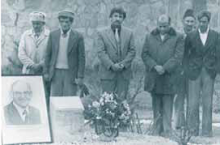
WHEN AMBASSADOR Chris Stevens was killed in Benghazi, Libya, in September, it was jarring for me to hear NPR refer to the last U.S. ambassador to be slain: my father, Adolph Dubs. He was kidnapped in 1979 in Kabul, Afghanistan, by Afghan extremists whose motives were never learned, and killed hours later in a botched armed response by the Soviet-allied Afghan government, even as U.S. diplomats pleaded for more time to negotiate.
My dad was 58, a career diplomat. After serving in the Navy during World War II, he had entered the foreign service, compelled by a deep desire to learn to use diplomacy to blunt the forces of fear and hate at the root of violent conflict. As a young man, he had considered the Lutheran ministry; he saw his work as a diplomat as a pragmatic way to build relationships, even with those whose histories and beliefs seemed alien to our own. People sensed this about him. Whether meeting with the Soviets at the height of the Cold War, with Serbian farmers in the former Yugoslavia, or, finally, with Afghans in the uncertain and perilous months before the Soviet invasion, he was universally respected for his integrity and commitment, and even loved for his genuine humanity and humor.
Among the many expressions of sympathy I received following his death, one photo is particularly meaningful. It's not the one depicting U.S. Secretary of State Cyrus Vance and other dignitaries receiving my father's casket at Andrews Air Force Base—rather, it's an image (above) taken in the courtyard of the embassy in Kabul. It shows the Afghan men who knew him, who had lived and worked around him during his time there. They are grouped around a memorial they had made, with his picture propped on it. These are the people who considered him a friend, understood what he was about in their country, and felt his loss, deeply and personally.
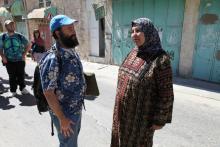
Over the past four years I have had the opportunity to spend a significant amount time in the Middle East. I no longer approach the time as a tourist, but instead seek out relationships and experiences as a listener who has much to learn about the way God is at work in contexts much different than my own. In that posture, it has been remarkable how much I have learned and begun to integrate into the way I live, love and lead back in my neighborhood. Theologian Paul Knitter describes it well when he refers to ones inherited worldview as a telescope.
"No matter how objective we may think we are or desire to be, we all see the world through a specific telescope/worldview. When we choose to look through the telescope of people who are “different” than us, we begin to get a more comprehensive picture of the world and the way God is at work within it."
Leading our first Learning Community to the Middle East apart of The Global Immersion Project I recently co-founded, I was invited to take a look through the lens of friends’ telescopes who live amid conflict in Israel and Palestine. Here are some of my key learnings:
LOS ANGELES — Unshaven and wearing a black hoodie and cap, Omar Elba looked out from the lectern, surrounded by a gold cross and organ pipes. "Moses, you are my nizzle fo' shizzle," said the Egyptian-born Muslim comedian, doing his best to channel Snoop Dogg.
It's a joke he's done before, but never in a church.
The unique setting of their performance inside Westwood Hills Congregational Church wasn't lost on any of the performers at the Sultans of Satire comedy show. Yet the sacred stage didn't keep them from swearing or talking about sex, although it inspired more jokes about growing up Jewish, Muslim, and Christian than one might typically hear during stand-up.
"I don't know whether to tell jokes or tell you my confessions," Elba said, opening up the show.
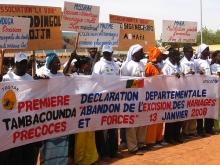
BOSTON -- The one thing that Afrah Farah will tell you about her genital cutting experience is that it happened. She doesn’t want to say how old she was, where it happened, or who was or wasn't with her.
Yet, despite the painful memories that the experience evokes and her concerns about people's reactions, Farah, said she knows she has to speak out.
“It’s basically a traumatizing experience. It’s traumatizing for every young girl that goes through that. It’s something that sticks in your memory, and physically,” said Farah, a Somali immigrant who came to the Boston area by way of Kuwait and Germany in 2007, and now works as a drug developer in a Massachusetts laboratory.
“There are millions of people who are affiliated with this procedure -- parents, grandparents, people in the community -- and to label them all as bad people or barbaric, that’s wrong. You will push them away. To solve a problem like this, you need to approach people with respect.”
Because of its severity and prevalence, female genital mutilation (FGM, or "cutting") is arguably one of the most important human rights issues in the world. It’s also become increasingly important in the U.S. as the number of immigrants from countries where it is practiced grows.
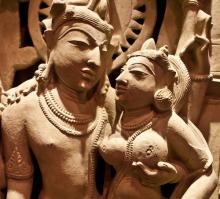
With their “True Love Waits” jewelry, conferences and T-shirts, Christians may be the face of the abstinence movement, but Muslims and Hindus are more likely to abstain from premarital sex.
That's the conclusion of a new study in the American Sociological Review, which also found that Muslims and Hindus -- at least in the developing world -- are more likely than Christians and Jews to refrain from extramarital sex.
“All major world religions discourage sex outside of marriage, but they are not all equally effective in shaping behavior,” said Amy Adamczyk of the John Jay College of Criminal Justice, who co-authored the study with John Jay doctoral student Brittany E. Hayes.
Drawing on the Demographic and Health Surveys funded by the U.S. Agency for International Development, the study included data from 31 developing nations collected between 2000 and 2008. The authors focused on individuals' responses to questions on religious affiliation, marital status, and sexual behavior outside of marriage.
Adamczyk said the study evolved from another study she was doing that found countries with large Muslim populations have very low rates of HIV and AIDS. "I was trying to figure out why that would be,” she said. One reason she considered was lower rates of sex outside of marriage.

NAIROBI, Kenya -- Church leaders are pressing the Kenyan government to scientifically test herbal medicines that are used by millions to manage and treat diseases, saying the nontraditional therapies could be putting patients' health at risk.
The leaders say HIV/AIDS patients and others suffering chronic conditions are widely using the medicines, whose efficacy is unknown.
A possibly significant development in Muslim-Christian-Jewish relations is being spear-headed by the Islamic Scholars of North America (ISNA). In July of 2012, ISNA Director of Community Outreach, Dr. Mohamed Elsanousi, convened a small multilateral forum of scholars in Mauritania to discuss challenges faced by religious minorities in Muslim-majority communities around the world.
Mauritania is an interesting choice, since it has no indigenous Christian population, and the CIA World Factbook lists the country as “(official) 100% Muslim.”
So, officially, Mauritania is 100 percent Muslim, which begs the question: If the ISNA is reaching out to Islamic scholars in Mauritania on the issue of minority religious rights, and the (official) statistic is that Mauritania is 100 percent Muslim, is this a tacit recognition on ISNA’s part that some of the 100 percent officially Muslim Mauritanians have secretly switched their religion … and that international human rights standards should allow them to do so?
If that’s the case, then this is a significant development in interfaith relations.
… the key word being if.
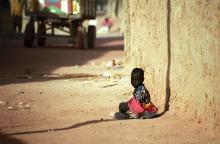
Peacemaking happens in many forms. Sometimes peace is offered to others, and sometimes given in unexpected ways.
It was early morning. The African sun had yet to rise above the mountains, and the sky was the soft yellow of newly shucked corn.
“Beep, beep,” sounded the horn on the old truck as it rumbled to a stop in front of my house. My old friends – Momadu, Madu, and Balamusa – greeted me with smiles, waves, and morning blessings.
We were on our way from Kenieba, a small town in western Mali, to Sitaxoto, a large village about two hours away over a broken dirt road.
A church was there, a little group of people who met each week outside under a big baobab tree to pray, study the Bible, share their stories and ask, “How do we follow Jesus?”
Most people in Washington know that changing the world is hard. But it's even harder when you're a sweet potato named Claude.
But Claude is more than just a sweet potato. Claude is a symbol.
From celebrity chefs and mom bloggers to churchgoers and YouTube stars, ONE campaign members are mobilizing en masse around the country today — World Food Day — to raise awareness of global hunger and malnutrition. These activities are part of a new campaign from ONE that’s calling on world leaders “to make measurable commitments to reduce chronic malnutrition for 25 million kids by 2016 so they can reach their full potential.”
As part of the campaign, supporters around the globe are celebrating the sweet potato, an example of a nutritious crop that can help fight chronic malnutrition. Which is why Claude is a sweet potato and not a french fry.
Every year, malnutrition is the underlying cause of more than 2.4 million child deaths — or more than one third of all deaths of children under the age of five. Chefs Mario Batali, José Andrés, Marcus Samuelsson, Spike Mendelsohn and Hugh Acheson are among dozens of celebrated chefs who will support the campaign by shining a spotlight on the humble sweet potato in the coming months.
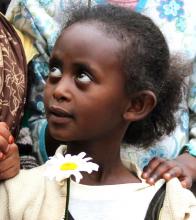
BAHIR DAR, Ethiopia — When I posted this photograph of a beautiful little Ethiopian girl holding a daisy a few days ago, my friend and fellow God's Politics blogger Christian Piatt responded on Twitter with a four-word comment:
"The Face of God."
Christian's remark stopped me in my tracks ... because it's absolutely true.

LONDON — As Britain awaits the appointment of the next archbishop of Canterbury to lead both the Church of England and the far-flung Anglican Communion, there's renewed attention on the woman who officially gets the final say: Queen Elizabeth II, the "Defender of the Faith."
The current archbishop, Rowan Williams, ends his 10-year tenure in December. A Church of England committee is sifting through candidates — two of whom will be submitted to Prime Minister David Cameron, whose top choice will be submitted to the queen for final approval.
When he announced his retirement last March, Williams, 62, famously said his successor will need "the constitution of an ox and the skin of a rhinoceros.”
Politicians and religious leaders say the next archbishop will need those qualities and more to handle deep divisions in the British church over female bishops and North/South divisions among his 77 million-member global flock over sexuality.
But he'll also need something else: the ability to envision life when Elizabeth — who turns 87 next year — is no longer on the throne, and when Britain is no longer a Christian-majority country.

We’ve been hearing an awful lot about the national debt lately – particularly during the current election cycle – and specifically, we’ve gotten an earful about the problem of our enormous debt to China. Though some mistakenly believe we borrow all of our money to finance our upside-down economy from China, the truth is that they hold only about one-tenth of our total debt, which is about the same amount as we owe to Japan.
What’s staggering is that, even at 10 percent of our total indebtedness, that still amounts to well over one trillion dollars. That, in itself, is close to $3,700 for every man, woman, and child in the United States, plus interest. And if you consider that we owe ten times that much, it’s nothing short of depressing.
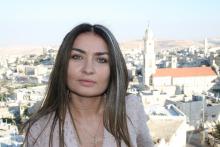
Bio: Catholic Palestinian film director and founder of the nonprofit Open Bethlehem. operationbethlehem.com
1. How did Open Bethlehem get started?
Growing up in Bethlehem, I always wanted to leave. I settled in London, but when events started becoming worse and worse in the region, I wanted to do something. So I went back and started working on a film. My cousin encouraged me and said, “Look at what’s happening to our city. Why don’t you do more than just a film?” And so together, in 2005, we started a campaign called Open Bethlehem.
2. What is its main goal?
The idea is to use Bethlehem as a doorway into the region. We created the Bethlehem Passport, which is like an honorary citizenship, inviting people to partake in the town that stands for joy and goodwill to all. The passport is an appeal to everybody to do something to help bring peace to the Middle East. We aim mostly at educating people abroad—policymakers, the media, and church leaders—about the plight of Bethlehem, its Christian community, and the diversity of the city.
